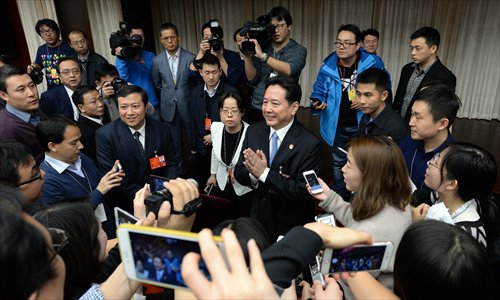Two sessions also a test for local officials' crisis management
Regional govts don’t understand importance of communicating with media: expert

Li Xiaopeng (center), governor of Shanxi Province, is surrounded by journalists on the sidelines of the annual political two sessions in Beijing on March 6. Photo: CFP
The ongoing annual sessions of the National People's Congress (NPC) and the National Committee of the Chinese People's Political Consultative Conference (CPPCC) in Beijing are not just a time for legislators to discuss national affairs.
Local government officials, many of whom are also NPC deputies, have to prepare themselves for a media grilling, as local scandals that made newspaper headlines in the past few months become hot topics during the provincial group's open sessions and press conferences.
To answer questions or not, and how to phrase answers in order not to lose face, remains a thorny issue for politicians who are increasingly aware of media and social media's power.
Some provincial leaders have learned to take the initiative when taking the public relations test, while others remain awkward.
Li Xi, secretary of the Liaoning Provincial Committee of the Communist Party of China, set a good example.
Li proactively told media about the investigation into senior official Wang Min for violating Party discipline.
On the other hand, some try to ignore questions and gave no answers to media, such as the leaders of Northwest China's Gansu Province who gave no clear answers about a journalist detained on charges of blackmailing government officials.
During their conference with media, a reporter from The Beijing News asked questions about the journalist who has been detained in Gansu's Wuwei, but the officials present reportedly just sat silently after the question was asked for about a minute until another journalist asked a different one.
Earlier reports said the Lanzhou Morning Post reporter, Zhang Yongsheng, had received threatening phone calls from police for publishing negative reports about local government. The follow-up investigation insisted that Zhang had engaged in blackmail, according to local authorities.
Important to talk
"Some leaders' unsatisfactory performance during the conferences indicates that they have not prepared properly and haven't realized how important it is to deal with the media and public opinion," Zhu Lijia, a professor of public management at the Chinese Academy of Governance, told the Global Times on Tuesday.
Zhu said that the annual legislative sessions are not only an opportunity for leaders to build a positive image of their government but also a stage for them to showcase their ability to deal with controversial incidents.
"Even though the overall capability of regional governments to deal with crisis relations has improved, some places, especially underdeveloped ones, still hold a conservative attitude toward media when controversies crop up," said He Hui, vice director of the Public Relations & Public Opinion Institute at the Communication University of China.
An infamous incident occurred during the two sessions in 2010, when Hubei Governor Li Hongzhong snatched away a Beijing Times reporter's recorder after being asked about a homicide case in which a waitress stabbed a local official to death to resist a rape attempt. The recorder was returned days later.
Media as a tool
"Respecting the facts, releasing authentic information quickly with a sincere attitude towards the public should be kept in mind by all officials when dealing with emergency incidents," said He.
Lu Hao, governor of Heilongjiang Province, has been described as adept in dealing with the media.
A tourist surnamed Chen from Changzhou, East China's Jiangsu Province, claimed he was charged over 10,000 yuan ($1,535) for a fish meal during a visit to Harbin, the capital of Heilongjiang, in February.
The incident drew public attention after Chen posted the bill online, which shows that the fish he ate cost 796 yuan per kilogram. The local industrial and commercial bureau and government were criticized for responding slowly and giving vague explanations to the public.
Lu told the media that this incident is not surprising and it shows that some officials and businessmen have weak legal awareness and neglect media's watchdog role.
Lu was quoted by the Xinhua News Agency as saying that the local government is now looking into this issue.
"Officials' knowledge of how to deal with the media and public opinion when faced with controversies is useful to publicize policies and enhance governmental credibility," said Zhu.
Newspaper headline: Questions about answers